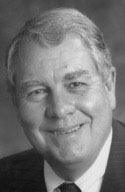Celebrating 35 Years — Vanguards Who Made a Difference: BOB CAREY
February 6, 2025 | 4 min to read
Over the course of the year, we pay tribute to 35 living Vanguards and 12 departed heroes. This month’s featured Vanguard is Bob Carey of the Produce Marketing Association.
Originally printed in the October 2020 issue of Produce Business.

Produce Marketing Association
Leading the Produce Marketing Association from 1958 until his retirement in 1996, Bob Carey inherited a floundering, nearly bankrupt organization, and basically reinvented and elevated PMA’s industry purpose, scope and influence, opening a renaissance of produce innovation and opportunity.
“During that 38-year period, he adeptly steered an organization that changed organically through the decades from a national one focused on packaging materials and technologies to a global one focused on marketing from seed to store” — store being the operative word, according to Bryan Silbermann, who carried the torch of Carey’s legacy for the next 34 years at PMA, 20 as its president/CEO.
“It was a produce renaissance, and Carey was a key person and catalyst in the heart of that renaissance.”
Carey had the foresight to cater to the evolving industry consolidation and buying dynamics, as retailers started exerting influence as the main buying group. The directional shifts generated a new and game-changing retail presence, which fueled the organization.
According to industry retail veteran Don Harris, Carey ingeniously recruited prominent, forward-thinking regional and then national retail chain executives to the PMA board. It changed the trajectory when Carey convinced Bob Backovich, who was vice president of produce at Safeway, the first big national chain, to participate. In those days, Safeway, among others, traditionally loathed such participation, and was averse to sharing information outside its company boundaries. Carey worked to break down those barriers.
Indeed, “Bob Carey was one of the industry greats,” says Dick Spezzano, former vice president of produce and floral at the Vons Company. “We had the power of the PMA behind us to sell the advantage of important programs and affect sweeping industry improvements.”
“The industry was awakening… there were so many new concepts… and Carey brought all these guys together — a mix of forward-looking retailers and growers/shippers. “It was always about pushing the industry forward, and even if we didn’t all agree, there were positive ways to reach a solution that could benefit everybody. It became like a brotherhood,” says Harris, adding, “We grew up watching Bob Carey and his contemporaries, on both the retail and supplier side, stirring the industry. They were willing to try something new, to discover innovative ways to do things differently and better. It was a produce renaissance, and Carey was a key person and catalyst in the heart of that renaissance.”
“It’s a correct statement that bringing in retailers to the PMA was a game-changer because United focused on the supplier side. Bob Carey said if the buyers come, then the vendors will follow,” says Spezzano, a member of the PMA board for 11 years and chair at one time. “Over the years, this happened. I think it’s pretty clear that the PMA size is probably three times plus of United in reserves, in membership, in companies, maybe a little less than that, but it is large and that Bob’s strategy worked,” according to Spezzano.
“In the PMA board and committee meetings, I’d be just as interested to hear from the growers/shippers side of the table; their concerns were my concerns, and they wanted to hear from my side of the table,” says Spezzano. “Bob used to say when you walk into those meetings, you take your company hat off and put your PMA hat on.”
“Bob had a wonderful way of bringing together people from diverse backgrounds with different business interests to find a commonality of purpose that could benefit all. He served in an era when the industry was growing fast and needed an organization that could adapt quickly to the changing needs of the membership,” says Silbermann.
“When produce directors at supermarkets found themselves accountable for building floral sales in the 1970’s, they turned to Bob to help them create better understanding of this category to forge links with floral suppliers. When restaurants started moving from frozen and canned vegetables and fruits to fresh in the late 1970’s, Bob and PMA again stepped up and helped produce suppliers build new bridges with distributors and operators,” says Silbermann.
“I had the pleasure and honor to be hired by Bob in 1983 and learned much of what I know about association leadership from him during the 13 years we worked together,” adds Silbermann. “By the time he retired in 1996, PMA had grown from 100 company members to thousands and its membership spanned the globe. He laid the foundation and gave us the tools and understanding to continue growing,” says Silbermann.
“Contemporary PMA leaders have asked me what kind of man Bob was and I’ve said, ‘He was your everyman, the uncle you could trust, the confidant who brought out your best by letting you find your own truth,’” says Silbermann. “A key lesson I’ve learned from Bob Carey is you can accomplish a lot more if you don’t care who gets the credit… From experience, association leadership is about building bridges, having one foot in the present, the other stretched out into the future, looking out over the horizon and helping your members find their own road forward. Focus on the status quo and you perish.”
Silbermann gave a eulogy in December, 2013, “We owe Bob Carey so much, because none of us would draw the great benefit we do from PMA were it not for the legacy created by the man we are gathered here today to honor and to remember. Bob Carey really was a Man for All Seasons and A Man for All Ages.”

